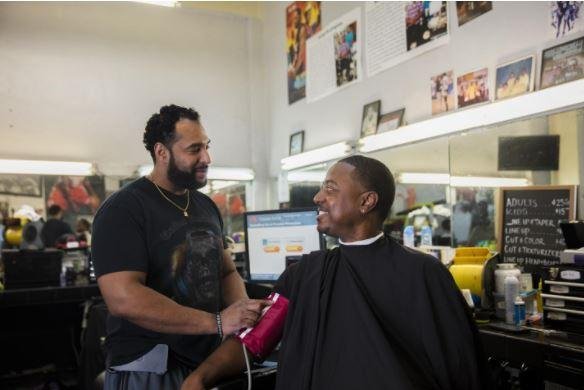Barber Eric Muhammad (left) takes the blood pressure of Mark Sims during a clinical trial of hypertension in African-American men at his shop in Inglewood, Calif. Photo courtesy of Smidt Heart Institute/Cedars-Sinai Medical Center
March 12 (UPI) -- Barbers helped deliver care to black men that reduced their blood pressure and related health risks, report researchers at Cedars-Sinai Medical Center.
Pharmacists worked with 52 Los Angeles barbershops to test and treat clients, which led to lower blood pressure and lower risk of death from the condition, according to findings reported Monday at the American College of Cardiology's annual conference in Orlando and published in the New England Journal of Medicine.
Uncontrolled high blood pressure is the leading cause of premature disability and death among African-American men, leading researchers to seek better methods of reaching them for preventive treatment.
Testing whether outreach would improve the situation, because black men generally have less physician interaction than black women, the researchers looked for a place in the community where they would be more apt to listen.
"When we provide convenient and rigorous medical care to African-American men by coming to them -- in this case having pharmacists deliver that care in barbershops -- blood pressure can be controlled and lives can be saved," said author Ronald G. Victor, MD, associate director of the Cedar-Sinai's Smidt Heart Institute in a press release. "High blood pressure disproportionately affects the African-American community, and we must find new ways to reach out so we can prevent strokes, heart attacks, heart failure and early deaths."
The study included 319 African-American men who had a systolic blood pressure reading of more than 140 mmHg, placing them at high risk of heart attack and stroke.
The participants were divided into two groups.
In one group, barbers encouraged patrons to meet with specially trained pharmacists monthly in the barbershop. They prescribed blood pressure medication, monitored blood tests and then sent progress notes to a primary care provider.
Their blood pressure dropped from 153 mmHg at the start of the study to 126 mmHg after six months. Also there was a decrease in diastolic blood pressure of 18 mmHg. After six months, almost two-thirds of participants brought their blood pressure into the healthy range.
In the second group, barbers encouraged customers to follow up with a primary care provider for treatment and make lifestyle changes, including increasing exercise and decreasing salt consumption. Their systolic blood pressure dropped from 155 mmHg at the start of the study to 145 mmHg after six months. Diastolic blood pressured dropped by 4 mmHg in this group. And after six months, 11.7 percent's blood pressure was in the healthy range.
"There is a different level of trust and respect that's earned when you meet people where they are, instead of in a hospital or clinic," said C. Adair Blyler, a pharmacist who treated patrons while they were in the barbershops. "The rapport I've been able to establish with this group of patients has been unlike any other I've had in my professional career."
Victor said trust and rapport is essential because high blood pressure a chronic condition that requires ongoing care and lifestyle changes.
"Once you have hypertension, it requires a lifetime commitment to taking medications and making lifestyle changes," Victor said. "It is often challenging to get people who need blood pressure medication to take them, even as costs and side effects have gone down over the years. With this program, we have been able to overcome that barrier."
Eric Muhammad, who owns New You Barbershop in Inglewood, was an eager participant.
"It's the silent killer, and it has cost the lives and health of a lot of good men," he said. "It's a no-brainer that black men are at the highest risk of high blood pressure. What's different about this study is it looks at ways to effectively bring it down with the help of your friends, family and support group."
He helped recruit 50 other barbershops to participate.
"A big takeaway from this study is to release the fears," said Muhammad, who is a co-author of the study. "We cannot fear what the doctor will tell us. Dr. Victor has a very sincere desire to bring down blood pressure in people in general, and in black men in particular. Since I could see his heart in this, it was easy for me to offer assistance."
In 2011, Victor published a study that showed that barbers could be effective in helping their patrons battle hypertension. That study was of 17 Dallas barbershops.
"This is a very significant effect for a hypertension trial of any kind," said Victor, whose hypertension was diagnosed by a barber in Dallas during his first barbershop-based study in the 1990s.
In 2014, Victory was awarded an $8.5 million grant aimed at enlisting African-American barbers in the fight against hypertension.
Researchers are now studying whether the benefits can be sustained for an additional six months.
Victor also hopes to expand the program to other parts of the country, including African-American men with more moderate blood pressure levels.















